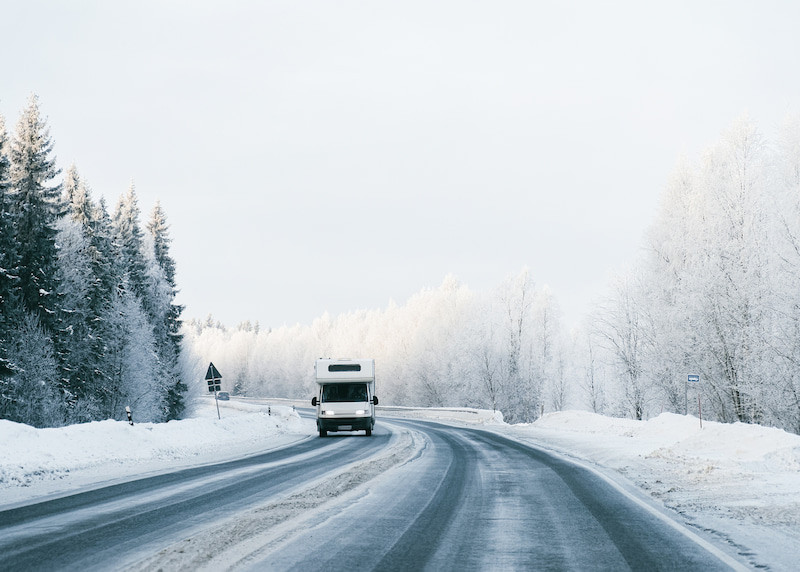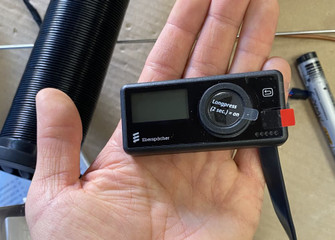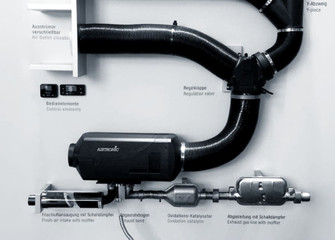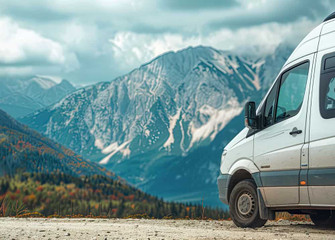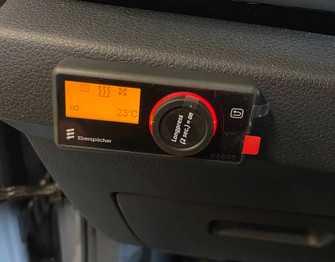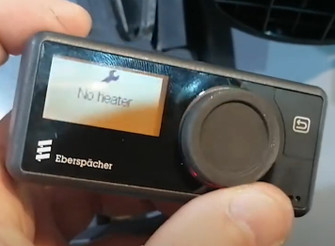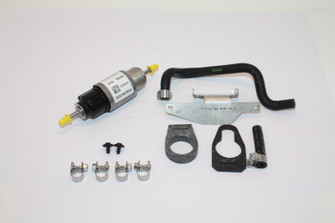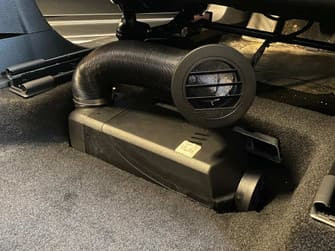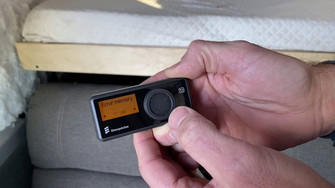Heating a camper van in winter: things to consider
Posted by Heatso on 31st Jan 2023
For many, a van becomes their home, for others, it’s a great vehicle for a summer road trip. Traveling in the winter can be an amazing experience, but it is more challenging than a summer trip.
STAYING WARM IN THE WINTER WITH CAMPER VAN HEATERS
For many, a van becomes their home, for others, it’s a great vehicle for a summer road trip. Traveling in the winter can be an amazing experience, but it is more challenging than a summer trip. In this guide, we go over the various ways you can stay warm in the winter, and outline the pros and cons of each approach.
ON THIS PAGE
CHOOSING BETWEEN CAMPER VAN HEATERS
Even if your conversion isn’t a 4-season one, vans are easily customizable. So, the No.1 solution to ensure warmth is installing a fuel heater. Choosing between air or water heaters can be difficult enough. But once your mind is set on a certain heater type, there are still several things to consider.
Heater Type
Camper van heaters come in two main types: air and water. Both have unique advantages and the most obvious question is whether you want hot water. Air heaters are compact and easy to install, but in order to get hot water, you’ll need an additional water heating system.
A water heater is highly versatile, as the applications of hot coolant are limitless. As the heater warms up the coolant, the liquid can be circulated through the engine bay, heat exchangers, or under the floor. As a result, you can preheat your engine, warm the cabin, have heated floors, and enjoy hot water at the same time. Combined air-water heaters are also an option.
Installation
Air heaters are fairly easy to install due to their plug-and-play design, and their compact size makes them easy to add to existing conversions. Our previous blog describes how to install an air heater in a van. In fact, manually installing an air heater can save you up to 2000$.
In contrast, water heaters are more complicated. However, more intricate setups can offer unique advantages. A well set up water heater system preheats the engine, ensures cabin heating, and provides hot water on demand. Because of this complexity, though, installation may require professional help.
Maintenance
Air heaters require little maintenance. Your primary task with maintaining an air heater is to regularly clean the vents and filters. A clogged filter can result in the heater underperforming. There’s a bigger danger of the system overheating too. You also need to be mindful of RV parking, as blocking cold air intake can often be underlooked.
Water heaters require a bit more care to avoid rust and ensure proper operation. It's crucial to maintain adequate water/coolant levels and drain water tanks when not in use. In addition to ensuring smooth water circulation and checking rubber gasket rings, you can also protect your RV with insulated pipes and skirting when parked.
Camper Size
To assess the required power of your heater, consider your camper size and desired functionality. A properly insulated camper van usually does not require more than a 2KW (6,800BTU) air heater. To supply hot water and preheat the engine, a 4KW water heater is usually the starting point.
That being said, you should be the judge of your situation, as many conversions are unique. As such, school bus conversions a.k.a. schoolies usually require at least an 8KW heater. The rule of thumb is to opt for a more powerful heater, as you can always turn the heating down.
DIESEL AND PETROL AIR HEATERS
Air heaters are incredibly popular within the camping and van life community. If you opt for an air heater too, make sure to choose the best suited one for your conversion. Air heaters come in great variety when it comes to performance and price. To avoid confusion, stick to the main things to consider.
Fuel options
The two most common types of air heaters are petrol and diesel. They are usually connected to the vehicle fuel tank. Commercial air heaters are energy efficient and don’t require an additional fuel tank for smooth operation.
Voltage
Air heaters come in either 12V or 24V options. 24V options are much more powerful, and are a perfect choice for heavy machinery or bus conversions. Usually, you want to go for a heater with the same voltage as your vehicle's electrical system.
Heat output
The most common heaters range between 2-4KW (6,800-13,600BTU), though more powerful options of up to 8KW (27,300BTU) are also available. 2-4KW heaters are perfectly sufficient for colder climates, especially if equipped with temperature sensors.
Temperature sensors often come with heaters, as is the case with the Espar Airtronic D4L. Additional temperature sensors can be added to enhance temperature control. Vanlifers usually use 8KW air heaters when living in bus conversions or other larger vehicles.
Altitude
What is the altitude at which you wish to travel? Every heater has an altitude limit at which it’s able to function. This attribute is one of the primary factors determining the heater cost too.
Once you know the required altitude, review your options. The Espar Airtronic S3 D2L functions at an astounding altitude of 18,000ft. For altitudes up to 5,000ft, a great option is the Webasto Air Top 2000 STC heater.
Maintenance
Campervan air heaters usually don’t require a lot of maintenance, but it’s a considerable factor in choosing one. The rule of thumb is that newer models will usually be more fuel-efficient, as well as easy to install and maintain.
With standard maintenance, the shelf life of an air heater really depends on its quality. Espar has made a breakthrough in 2022 with its Airtronic Series 3 air heaters, achieving a record-breaking 5,000-hour lifespan.
Cost
As air heaters can be considered essential, their price range can greatly vary. Starting with options below 1,000$, advanced modern heaters may cost up to several thousand. Usually, air heaters are not hard to install, so you may end up saving on installation costs.
Among the top diesel heaters for camper vans, The Wandering RV ranked the German manufacturers Webasto and Espar as offering the most value. A vast variety of Espar and Webasto air heaters are available on Heatso.
RELATED PRODUCTS
HEATING A CAMPER VAN WITH A WATER HEATER
We take hot water for granted at home but surely miss it when exploring the great outdoors. Installing a water heater provides camper van heating with the added benefit of having access to hot water. When installing a water heater, there are several criteria to know your options.
Fuel options
Same as it is with air heaters, fuel water heaters come with diesel or petrol fuel options. When choosing a water heater, the fuel type can play a bigger role than with air heaters.
Air heaters are usually quite compact. Water heaters, however, can offer additional benefits, usually requiring extra piping. A heater of the same fuel type as your vehicle will save space otherwise used for an additional fuel tank.
Voltage
As with air heaters, water heaters operate on 12V or 24V electrical systems.
A 12V heater should be powerful enough to support all your needs. 24V water heaters are mostly used in heavy machinery. Ultimately, you should choose based on the voltage of your vehicle.
Heat output
Most heaters come in the power range of 2-4KW (6,800-13,600BTU). However, 2KW may not suffice depending on your needs. Heaters can always be adjusted to produce less output. On the other hand, a less powerful heater might not supply you with the required amounts of heat.
When installing a water heater, it’s a smart choice to use its capabilities to the max. In addition to providing cabin heating, modern heaters like the Espar Hydronic B5E offer an array of benefits. With an Espar water heater, you'll be able to heat your floors, take a shower, and even preheat your engine.
Altitude
Altitude is an important factor when choosing a heater operating on fuel combustion. Operating altitude is one of the indicators affecting the heater price. As water heaters can be rather expensive, it’s important that you evaluate your needs.
Depending on other factors, you may consider a heater operating in lower altitudes equipped with a high altitude kit if needed. As a safe choice, you might also choose a heater operating at higher altitudes.
Maintenance
With as much value as water heaters offers, they require substantial maintenance. In order to function, these heaters require consistent water flow, so checking the water tank heater is crucial. To avoid rust or freezing, drain the system if you plan to stop using the heater for a while.
Pipes require extra attention too. After pipe insulation, regularly check for condensation and target the issue as it arises. In addition, make sure that pipes and rubber gasket rings aren’t worn out, and if so, replace them. With proper maintenance, a water heater such as the Espar Hydronic D5E can deliver 5,000 hours of operation.
Cost
Water heaters are one of the best ways to keep your cabin warm and supplied with hot water. That being said, a good water heater system might be one of the priciest elements of your conversion.
Water heater prices may vary, starting at several hundred and exceeding several thousand. Installing a water heater system usually requires professional help. With all this in mind, having a water heater could take your van life experience to a whole new level.
RELATED PRODUCTS
OTHER OPTIONS
Fuel heaters are a primary solution to consider when keeping your van warm. However, there are many other conventional and creative ways of combatting cold climates. Some of your other options may include:
Electric heaters
Electric heaters connect to a power source in your vehicle it heats the air in your cabin. Electric heaters are compact and can be portable or mounted onto a wall of your van.
Electric heater advantage over combustion heaters is that they aren’t affected by altitude. They aren’t as expensive as heaters fuel combustion heaters. Electric heaters make the perfect addition to fuel heaters if you want some extra comfort.
Propane heaters
They’re compact, powerful, and inexpensive. Overall a great option, but they do have some substantial disadvantages.
Consuming a lot of propane, they aren’t as ergonomic as fuel combustion heaters. In order to supply the propane, you’ll also need to keep a propane tank, taking up precious storage space. Moreover, obtaining propane on the road can be an issue if you intend to travel to remote locations. These factors make propane heaters the least popular heater option on the market.
Wood-burning stoves
Modern wood stoves offer a lot of versatility. Some are designed to function as a stove for cooking, some have a viewing window to deliver a cozy feel of a fireplace. Firewood is much cheaper than propane too.
What you need to keep in mind, however, is that in order to ensure safety, you might need to remodel your RV. Installing a wood stove requires heat-proofing the van, and mounting heat shields, as well as floor protection. Modern wood stoves are very safe, but should never be left unsupervised, and installing a CO detector is simply a must.
PREPARING THE CAMPERVAN FOR WINTER
Getting ready for the cold season means taking care of more than just the heating. For a comfortable climate inside your van, you also need to consider the following:
Insulation
Insulation is usually the first step of converting a camper van. It's virtually impossible to stabilize the microclimate of your cabin without insulation. This is especially relevant in winter.
The walls, flooring, and roof of your home should be well insulated so that as little heat escapes as possible. In addition, vapor retardant insulation could help you avoid mold and even rust, as well as prevent condensation. You will also need less active heating to stay warm.
Ventilation
Another major factor in your cabin microclimate is moisture. Humidity can be a major issue, especially if you have a kitchenette. To combat increased humidity in a campervan, you need reliable ventilation.
Although it may sound odd to let cold air in on purpose, fresh air must still circulate. If there is no roof vent, you can use a portable 12V dehumidifier, which works very well. Lastly, an AC unit can also remove excess moisture from the air, so it’s another option you may consider.
SUMMARY
Make the most out of your winter experience and stay active. Winter is a special time offering unique activities, such as skiing. If you decide to go on a hike, always bring a vacuum flask with hot tea or coffee. Hot drinks and food will keep you warm indoors too.
In summary, staying warm in the colder seasons is essential and now you know how. Air heaters are an affordable, efficient, and convenient solution. But if you want something more versatile to heat your floors and preheat the engine, we suggest opting for a water heat
